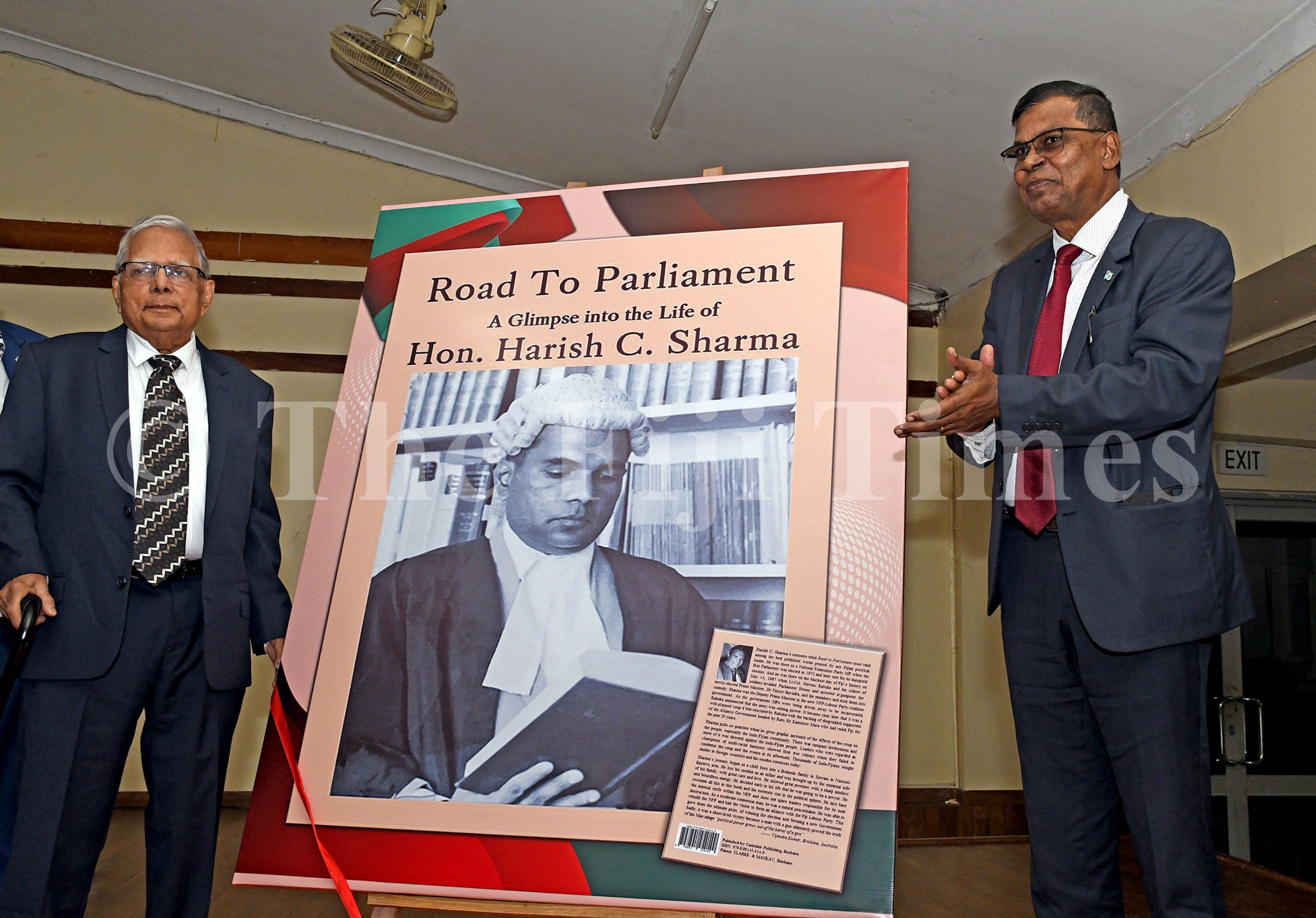SINCE time immemorial, scores of Fijians – all with the aim to transform our beloved nation – have walked the hallowed halls of the country’s august House.
But strife, further inflamed by three coups, has always been at the cornerstone of Fiji’s governance. Yet, despite the rocky political scenario, Fiji has produced some of the finest statesmen over the years.
Among those is Harish Sharma, a lawyer by profession who went on to pursue a career in politics.
The eminent figure eventually took up leadership of the National Federation Party (NFP) and Opposition leader, and after the 1987 general elections, he served as the Deputy Prime Minister and Minister for Housing, Urban Development and Information.
Now 92, Mr Sharma is one of the last living politicians of an era long gone. And to detail his life journey, he penned a memoir with some of his closest friends and family – including the first local editor of The Fiji Times, the late Vijendra Kumar.
Titled Road to Parliament: A Glimpse into the Life of Hon. Harish C. Sharma, the memoir details Mr Sharma’s illustrious career.
During the launch of the memoir at the Jai Narayan College in Suva last Thursday, NFP leader Professor Biman Prasad shared that every descendant of the girmitiya had a story to tell.
He said this was about his or her struggles, how it shaped their lives, and eventually led them to achieve things in life — no matter how big or small it was.
“The same is true for descendants of the first settlers in our beloved nation – the indigenous people or the iTaukei, members of the Indo-Fijian community who came to these shores after the end of indenture, the European, Rotuman, Melanesian and the Chinese communities.”
And this extends to Mr Sharma, who aptly summed up his story by saying there was a common misconception that he was born with a silver spoon in his mouth.
Far from it.
Mr Sharma’s story starts the same way it does for many Indo-Fijians — with the arrival of their forefathers from India who were part of the indentured system.
In his memoir, Mr Sharma writes that both sets of his family, paternal and maternal, were brought to Fiji to work on the cane farms.
His paternal great grandfather Tulsi Ram, and great grandmother Parbati, were both from Chandpur in Azamgarh, Uttar Pradesh.
His grandfather Jamuna Prasad was born onboard the Hereford as the ship was in Fiji waters in April of 1888.
While his great-grandparents eventually returned to India, his grandfather eventually returned to Fiji with his wife and his young son Pratap Chandra Sharma, who would eventually go on to become Mr Sharma’s father.
Mr Sharma writes that this family arrived in Fiji in July 1912, and worked as indentured labourers in Sawani, Rewa. By 1918, the family had become free residents and decided to settle in Sawani.
After the passing of Mr Sharma’s grandmother, his grandfather and father held the family unit together.
“Baba (grandfather) brought up, looked after and educated all his four children at great personal sacrifice and through the meagre earnings of priesthood,” Mr Sharma’s memoir reads.
“The childhood of Pita Ji (father) and his other siblings was one of great poverty and hardship and though pure vegetarians, uncle Brij Kishor and Pita Ji were physically very active and powerful men.
“None of Baba’s children received formal education but he tutored them at home and consequently all of them were well versed in the Hindu religion, literature and culture.
“Under Baba’s guidance, they all grew into industrious, confident and enterprising citizens.
“As a young man Pita Ji was bubbling with energy. He was a self-made man and through his personal efforts and Baba’s guidance attained an excellent knowledge of the Hindi language.”
On the other side, his maternal grandparents Gayadin Maharaj (grandfather) and Gangajali Maharaj (grandmother) were from Basti, India.
They had five children, including Mr Sharma’s biological mother Balraji (Bachhi).
Subsequently, Mr Sharma was born in May 1932 sometime after his parents’ nuptials.
In the memoir, Mr Sharma revealed that his mother died when he was only a one-year-old.
“Sadly, there is no photo of my mother, and I do not know what she looked like. To not know my mother is a tragedy I have borne throughout my life.
“Soon after my mother’s death, family members got together to decide on my future. There was no grown-up female in father’s household to take care of me and it was mutually agreed that my future upbringing and custody be given to my maternal grandparents.
“Thus, to all intents and purposes, from the age of one I was virtually adopted and brought up by my maternal side and grew up in the tender love and care of a home different from the rest of my other siblings.
“Some six months after mother’s death, father married maa Phul Mati who gave me the same love, affection and care as she did to all my brothers and sisters born of her.”
Mr Sharma wrote that despite the lack of formal education, his maternal grandparents and other family members brought him up and he was “happy and comfortable as any child.”
• Next week, read about Mr Sharma’s schooling and journey into politics.



